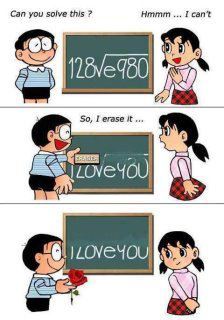Can I love you without a calculator?
 As the photo above shows, the following equation:
As the photo above shows, the following equation:
1 2 8 e 9 8 0
gives the message "I Love You" when half of it is erased. However, what is the value of 1 2 8 e 9 8 0 when rounded down to one decimal place?
Photo credits: iblogangela
Details and assumptions: e 9 8 0 is defined as e × 9 8 0 .
Please try not to use a calculator for this.
The answer is 6606.4.
This section requires Javascript.
You are seeing this because something didn't load right. We suggest you, (a) try
refreshing the page, (b) enabling javascript if it is disabled on your browser and,
finally, (c)
loading the
non-javascript version of this page
. We're sorry about the hassle.
7 solutions
The solution to this problem is trivial and is left as an exercise to the reader.
whats the solution??
Seriously... No solutions??
Same what I did
When did nobita get this smart.? He used to fail in all subjects .
t h e v a l u e o f e i s 2 . 7 1 8 s o , 2 . 7 1 8 × 9 8 0 = 2 6 6 3 . 9 1 6 n o w , 2 6 6 3 . 9 1 6 = 5 1 . 6 1 3 h e n c e , a n s w e r i s 1 2 8 × 5 1 . 6 1 3 = 6 6 0 6 . 4 6
what is actually e?
Log in to reply
Eulers number is a value that represents a number summing itself infinitely small so 1+.5+.25 etc. eventually you get 2.718 blah blah blah.
You can treat it as a constant because it is used as a multiplier to find what the value of a specific number would be in that scenario or that particular type of compounding which is common in nature I suppose.
Anyways, this answer isn't completely accurate so if someone is willing to give a detailed explanation while correcting mine, that'd be great ; )
Log in to reply
Euler's number is the limit as n approaches infinity of (1+1/n)^n or the infinite series of 1/n!. It is the number that is the base for continuous interest and it shows up in a lot of other cool places like e^(i*pi)+1=0.
Euler's number, a mathematical constant.
Then I used a calculator to check and get 6606.13
this person don't want us to use a calculator, but it does not stop us from using pen and paper...it however took three turns to get to correct answer
1 2 8 e ∗ 9 8 0 = 1 2 8 e ∗ 2 2 ∗ 5 ∗ 7 2 = 1 2 8 ∗ 1 4 e ∗ 5 = 1 7 9 2 e ∗ 5
at which point we can approximate e =2.718 then use guess &check method to approximate square root
≈ 1 7 9 2 2 . 7 1 8 ∗ 5 = 1 7 9 2 ∗ s q r t ( 1 3 . 5 9 ) ≈ 1 7 9 2 ∗ 3 . 6 8 5 = 6 6 0 3 . 5 and checking with calculator 1 7 9 2 e ∗ 5 = 6 6 0 6 . 4 8
I really don't know is there any solution for this without using a calculator?
Yes, one that'd involve tedious calculations.
Plugging this equation into a calculator gives the value 6606.48188... which should round up to 6606.5, no?
I said rounded down...
Log in to reply
@Charlton Teo how you did it without using calculator?
its 6606.1393
For anyone still doing those here is the solution I entered : 6528 (and got correct, I know it's not the right value but it's an honest approximation to me). How I got to that number : e ≈ 2 . 7 = 2 7 / 1 0 9 8 0 × e ≈ 2 7 × 9 8 = 2 7 × 1 0 0 = 3 × 9 × 1 0 0 s q r t ( e 9 8 0 ) ≈ 3 × 1 0 × s q r t ( 3 ) = 3 0 × s q r t ( 3 ) s q r t ( 3 ) ≈ 1 . 7 3 0 ∗ 1 2 8 = 3 8 4 0 1 2 8 s q r t ( e 9 8 0 ) ≈ 1 2 8 ∗ 3 0 ∗ 1 . 7 = 6 5 2 8 Sorry about any bad presentation, I'm not used to do this.
Use a calculator. I obviously do not understand English.